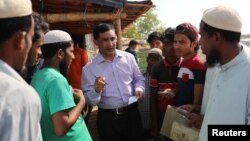U.N. High Commissioner for Human Rights Michelle Bachelet is calling on Bangladeshi authorities to conduct a prompt and thorough investigation into the killing of Rohingya activist Mohib Ullah while he was visiting a Cox’s Bazaar refugee camp in Bangladesh earlier this week.
Bachelet paid tribute to the prominent human rights defender, who she said spent his life fighting to end decades of discrimination against the Rohingya people. She said Ullah lost his life while seeking to restore his people’s basic rights in Myanmar, including their rights to nationality, land, health, and education.
Ullah was shot and killed by unknown assailants Wednesday in Kutupalong, the world’s largest refugee camp, housing more than 800,000 Rohingya. The refugees fled there in August of 2017 to escape persecution and violence in Myanmar.
The high commissioner’s spokesman, Rupert Colville, says the Rohingya are still waiting for justice and still waiting to return home. He says there has been an alarming increase in violence, criminality, and rising tensions among groups in the Kutupalong camp. He adds anti-Rohingya sentiment also has been rising within Bangladeshi communities.
“Whoever was responsible for his murder, Mohib Ullah’s death is a clear example of the insecurity in the camp, and the apparent attempts to silence moderate civil society voices. The high commissioner is calling for a prompt, thorough, and independent investigation, which should be conducted not only to identify and apprehend his killers, and expose their motives, but also to define what measures are needed to better protect vulnerable civil society leaders, while avoiding further securitization in the camps,” he said.
Colville said the high commissioner understands the huge challenges Bangladesh faces in hosting Rohingya refugees. Nonetheless, Bachelet asserts Bangladesh must ensure the safety, protection, and basic rights of the refugees in Cox’s Bazar. She said that also applies to Bhasan Char, a remote island where thousands of Rohingya have been relocated.
“Meanwhile, in Myanmar itself, the situation of approximately 600,000 Rohingya who remain in Rakhine State remains dire, with many still confined in camps,” said Colville. "Alleged violations include unlawful killings, arbitrary arrest and detention, and high levels of extortion.”
Colville said it is regrettable the global spotlight has moved away from the plight of the Rohingya people. He added that the high commissioner is calling on the international community to do more to help the persecuted community, both in Bangladesh and in Myanmar.
UN Seeks Investigation Into Killing of Rohingya Rights Defender
- By Lisa Schlein

GENEVA —



